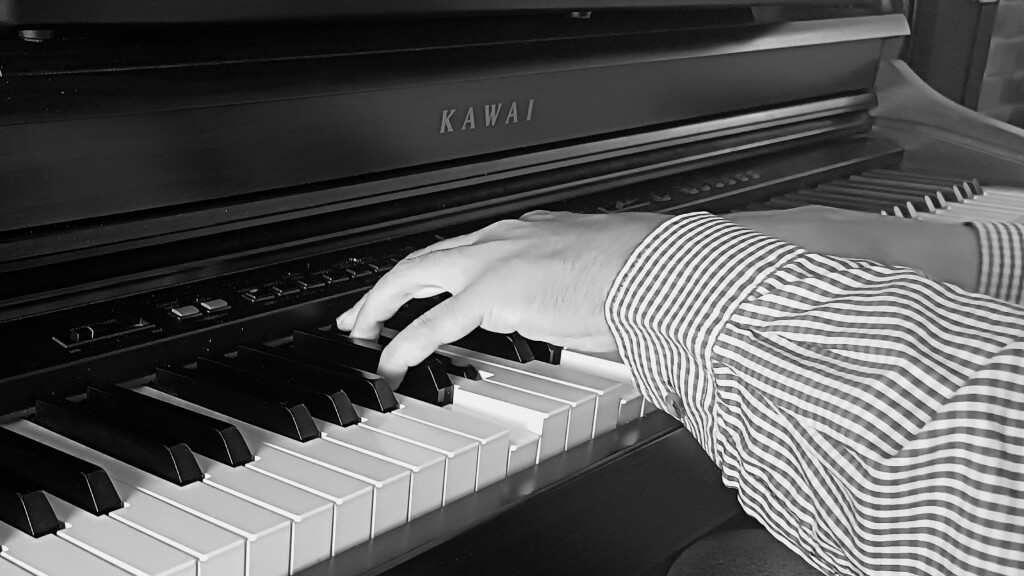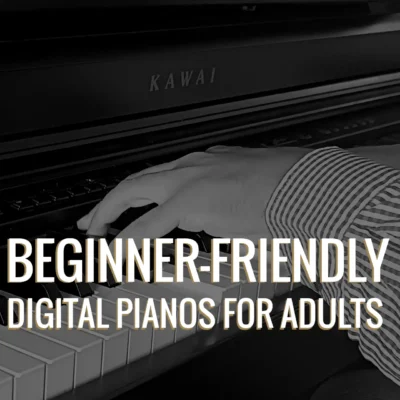Did you know that learning to play the piano as an adult can improve cognitive function by up to 30%? It’s never too late to tickle the ivories! Whether you’re chasing a dream or starting a new hobby, finding the right digital piano is key to your musical journey. I’ve been there, and I know how overwhelming it can be to choose from the sea of options out there. I’ve made this guide to show the best beginner digital pianos for adults in 2024. It will help you pick the perfect instrument to create beautiful music.
As someone who’s personally tested dozens of digital pianos, I can tell you that from compact designs to weighted keys, we’ve got you covered. Let’s dive in and find your ideal musical companion!

What to Look for in a Beginner Digital Piano
Before we jump into the specific models, let’s talk about what really matters when you’re choosing your first digital piano. Trust me, I wish someone had given me this rundown when I started!
- Key action and weight: This is crucial! You want keys that feel like a real piano. I remember the first time I played a digital piano with weighted keys – it was a game-changer.
- Sound quality and polyphony: Look for rich, realistic piano tones. Higher polyphony means you can play more complex pieces without notes cutting off.
- Built-in features: A good metronome is a must-have. Recording functions and learning modes are fantastic for tracking your progress.
- Connectivity options: USB and MIDI connections open up a world of possibilities. And don’t forget a good headphone jack for those late-night practice sessions!
- Size and portability: Consider your space. I once bought a piano that was too big for my apartment – rookie mistake!
- Price range: Luckily, there are great options for every budget. You don’t need to break the bank to get started.
Top 5 Budget-Friendly Digital Pianos for Adult Beginners
After trying out countless models, here are my top picks that won’t empty your wallet:
- Yamaha P-45: This was my first digital piano, and it’s still a favorite. Great weighted keys, simple interface, and Yamaha’s renowned sound quality. Perfect for beginners!
- Casio PX-160: A close runner-up. The key action is slightly stiffer than the Yamaha, which some beginners prefer. Plus, it has a better speaker system.
- Roland FP-10: Roland’s SuperNATURAL sound engine shines here. It’s compact and the key action is top-notch for the price.
- Korg B2: Don’t let the simple design fool you. The sound quality is impressive, and it’s incredibly easy to use.
- Kawai ES110: A bit pricier, but worth it if you can stretch your budget. The key action is one of the best in this range.
Best Digital Pianos with Weighted Keys for a Realistic Feel
When I first played a piano with weighted keys, I couldn’t believe the difference it made in my playing. Here are my top picks:
- Yamaha P-125: The Graded Hammer Standard (GHS) keyboard is a joy to play. It really helps build proper finger strength.
- Roland FP-30X: The PHA-4 Standard keyboard with Escapement is as close as you’ll get to an acoustic piano in this price range.
- Kawai ES520: A bit of a splurge, but the RH3 keyboard action is simply stunning. It’s helped my technique immensely.
Remember, weighted keys are crucial for developing proper technique. I can’t stress enough how important this is for beginners!
Beginner Digital Pianos with Great Learning Features for Adults
Learning as an adult can be challenging, but these pianos make it so much easier:
- Casio PX-S1100: The Chordana Play app is a game-changer. I’ve spent hours using it to learn new pieces.
- Yamaha DGX-670: The built-in lessons and LCD screen make learning fun and interactive. Plus, it has a mic input for singing along!
- Roland FP-90X: While pricier, the Piano Partner 2 app and built-in exercises are fantastic for self-paced learning.
Compact Digital Pianos for Small Spaces
Living in a small apartment doesn’t mean you can’t have a great piano. These space-saving options are perfect:
- Korg LP-380U: Sleek, stylish, and incredibly compact when the lid is closed. It’s been a perfect fit in my cozy living room.
- Casio PX-S1100: Incredibly thin and lightweight. I’ve taken this to gigs in the back of my compact car!
- Roland GO:PIANO88: Super portable with 88 full-sized keys. Great for those who need to stow their piano away between practice sessions.
Connectivity and Tech Features for Modern Musicians
As someone who loves to experiment with music production, these features are a must:
- Yamaha P-515: Bluetooth audio and MIDI connectivity make this a versatile powerhouse.
- Nord Piano 5: While more advanced, its seamless integration with DAWs is unparalleled.
- Casio PX-560: The color touch screen and extensive sound library are perfect for tech-savvy beginners.
How to Practice Effectively with Your New Digital Piano
Now that you’ve chosen your piano, here’s how to make the most of it:
- Set up a regular practice routine. Even 15 minutes a day can make a huge difference.
- Use the built-in metronome to improve your timing. It’s frustrating at first, but stick with it!
- Record yourself playing and listen back. It’s eye-opening to hear your progress over time.
- Explore online resources. I’ve found YouTube tutorials and apps like Simply Piano incredibly helpful.
Conclusion
Starting to learn piano as an adult is exciting. Choosing the right digital piano is your first step. From budget options for beginner digital pianos like the Yamaha P-45 to advanced models like the Roland FP-90X, there’s a perfect keyboard for every new pianist.
Remember, if you are new to the world of enjoying a musical instrument the best for you among the list of beginner digital pianos is one that inspires you to sit down and play every day. For me, it was the Yamaha P-125 – its realistic key action and rich sound kept me coming back for more practice sessions than I care to admit!
So, which of these beginner digital pianos caught your eye? It’s time to make your choice, start those piano lessons, and let the music flow through your fingertips. Who knows? You might be the next viral sensation on YouTube’s piano covers! Happy playing, and don’t forget to share your progress. I’d love to hear how you’re getting on with your new musical companion!
FAQ
Are weighted keys really necessary for a beginner digital piano?
Absolutely! Weighted keys are crucial for developing proper finger strength and technique, especially for adult beginners. Digital pianos with weighted keys, like the Yamaha P-125 with its Graded Hammer Standard (GHS) keyboard, provide a realistic feel similar to acoustic pianos. This feature helps you build the right muscle memory and makes transitioning to an acoustic piano much easier in the future. While you might find unweighted keyboards cheaper, investing in a digital piano with weighted keys will significantly benefit your learning journey in the long run.
Can I use a digital piano for both learning and music production?
Yes, many modern digital pianos are versatile enough for both learning and basic music production. Look for models with MIDI and USB connectivity, like the Yamaha P-515 or the Casio PX-560. These features allow you to connect your digital piano to a computer or tablet, enabling you to use learning apps, record your performances, and even integrate with Digital Audio Workstations (DAWs). Some advanced models like the Nord Piano 5 offer seamless integration with music production software, making them ideal for beginners who also want to explore music creation and recording.
How important are polyphony and sound quality in a beginner digital piano?
While beginners might not immediately need high polyphony (the number of notes that can be played simultaneously), it becomes important as you progress. A digital piano with at least 64-note polyphony, like the Roland FP-10, ensures that notes won’t cut off when playing more complex pieces or using the sustain pedal. As for sound quality, it’s crucial for staying motivated and developing a good ear. Brands like Yamaha, Kawai, and Roland are known for their realistic piano tones. The Kawai ES110, for instance, offers impressive sound quality that can inspire you to practice more often. Remember, a digital piano that sounds good will encourage you to play more!


